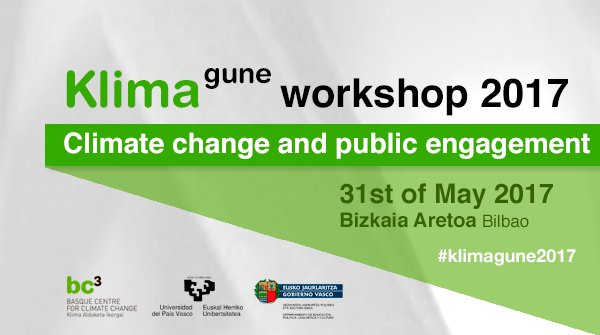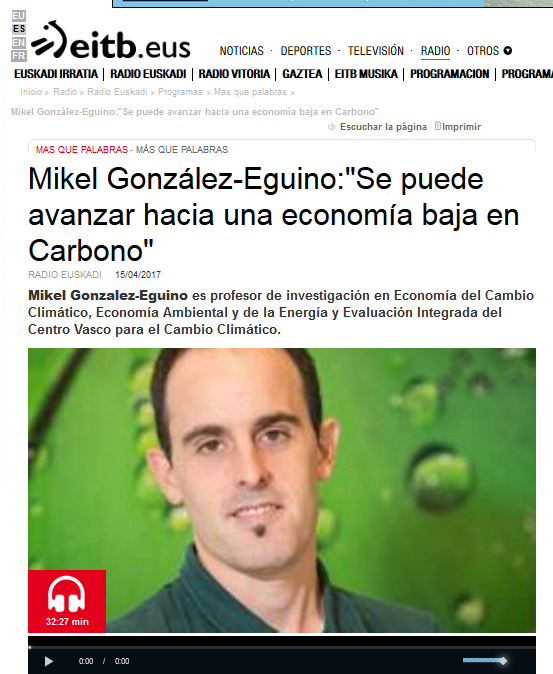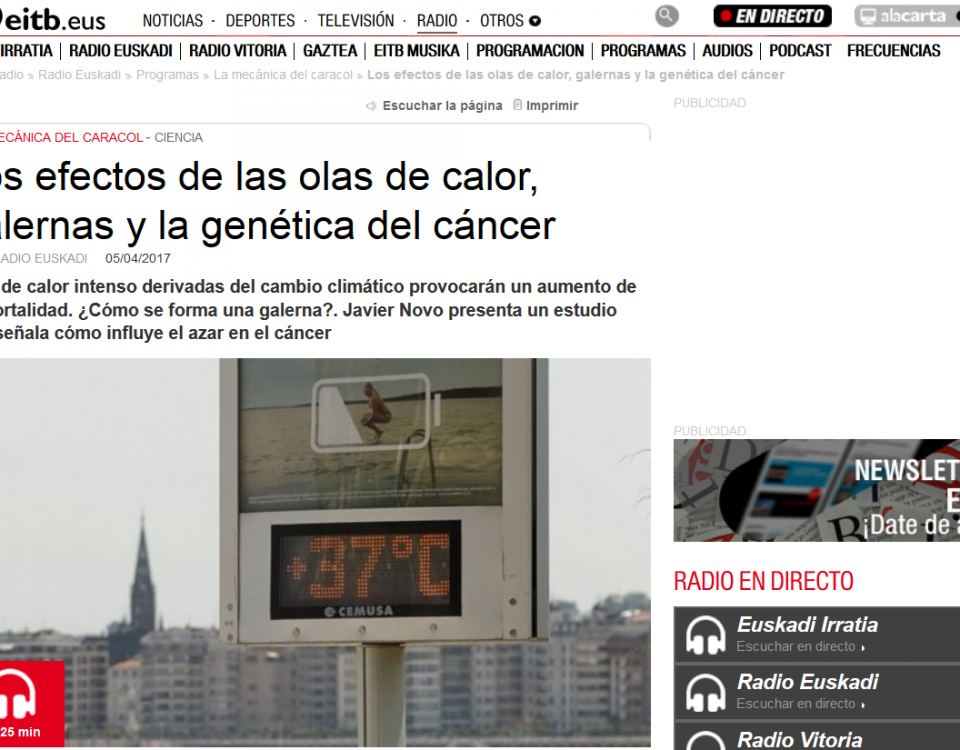May 29, 2017
Published by Maria Jose Sanz Ignacio Palomo at May 29, 2017
Categories
"KLIMAGUNE 2017 - CLIMATE CHANGE AND PUBLIC ENGAGEMENT"The challenge of Klimagune 2017 – the two-yearly gathering on climate change– is to join forces in generating new transdisciplinary knowledge of climate change and transmitting it to numerous audiences by means of innovative dynamics of engagement.Its goal is to activate a framework of collaboration intended to remain permanently in place for all agents obliged to engage in action against climate change: from academia and the institutions to all citizens.Organised by BC3 (Basque Centre for Climate Change) and the University of the Basque Country, the 7th edition of this workshop will analyse forms and degrees of social engagement in regard to climate change, with contributions by some of the most respected thinkers and leaders in the field.With this call to generate networks of action in which all agents take an active part, Klimagune 2017 takes up the spirit of action following the Paris Agreements.
May 26, 2017
Published by Maria Jose Sanz BC3Research at May 26, 2017
Categories
May 22, 2017
Published by BC3Research Sérgio H. Faria at May 22, 2017
Categories
Inaugurated the BC3-NUT Office for coordination of the relations between Japan and Europe within the framework of Japan’s Top Global University (TGU) Project through the Nagaoka University of Technology.- The BC3-NUT Office has been officially opened at the headquarters of BC3 - Basque Center for Climate Change in Leioa. Its mission is to coordinate the relations between Europe and Japan within the framework of Japan’s Top Global University (TGU) Project together with the Nagaoka University of Technology (NUT, Japan).- The attraction of this project to THE Basque Country is the result of the collaboration between BC3 and NUT, with the aid of bizkaia: talent.
May 4, 2017
Published by BC3Research Luis Mª Abadie Ibon Galarraga Elisa Sainz de Murieta at May 4, 2017
Categories
"Cities in Southeast Asia, Eastern Africa and on US West Coast need to act on sea-level rise most urgently".[Leioa (Spain), 4th May 2017] For people and insurance companies alike, it is the extreme events – with low probability but highly damaging - that are the most devastating. Storm Desmond, for example, flooded northwestern areas of the UK in 2015, and Hurricane Katrina wreaked catastrophe on New Orleans in 2005. The same is true when it comes to future sea level rise. Now a study assesses coastal flood risk from sea level rise for 120 major coastal cities, and shows which cities are most vulnerable to extreme events.
April 15, 2017
Published by BC3Research Mikel González-Eguino at April 15, 2017
Categories
Interview gave by the Bc3 researcher, Mikel González-Eguino, in "Más que palabras (Radio Euskadi)" radio programme "Se puede avanzar hacia una economía baja en Carbono"Mikel Gonzalez-Eguino es profesor de investigación en Economía del Cambio Climático, Economía Ambiental y de la Energía y Evaluación Integrada del Centro Vasco para el Cambio Climático.
April 6, 2017
Published by BC3Research Elisa Sainz de Murieta at April 6, 2017
Categories
Interview of Elisa Sainz de Murieta in "La mecánica del caracol (Radio Euskadi)" radio programme "Los efectos de las olas de calor".
April 6, 2017
Published by BC3Research Amaia de Ayala Aline Chiabai Elisa Sainz de Murieta at April 6, 2017
Categories
Según el estudio del instituto vasco de investigación de cambio climático, BC3, las olas de calor son consideradas por la Organización Mundial de la Salud como uno de los fenómenos meteorológicos extremos “más peligrosos” con gran impacto sobre la salud de las personas. “El País Vasco no queda al margen de esta tendencia climática”, resumían los expertos del instituto vasco de investigación de cambio climático. Por eso, desde 2006 existe un Plan de prevención en situación de ola de calor que describe los efectos posibles de una situación de calor extremo sobre la salud de las personas e identifica los principales grupos de riesgo.
April 6, 2017
Published by BC3Research Amaia de Ayala Aline Chiabai Elisa Sainz de Murieta at April 6, 2017
Categories
Un estudio financiado por el Gobierno vasco que pone cifras concretas a lo que podría ocurrir en Euskadi en una proyección de cara a los próximos 80 años. Si no se adoptan medidas correctoras, a partir de 2020 las olas de calor podrían incrementar la mortalidad hasta un 58%, en el escenario más desfavorable.El estudio presentado en el foro Klimatek, en Bilbao, está firmado por el centro vasco de investigación de cambio climático BC3, y cuenta con el respaldo del Departamento de Medio Ambiente del ejecutivo de Lakua.
March 28, 2017
Published by BC3Research at March 28, 2017
Categories
The Spanish TV Programme LAB24, specialized in the dissemination of scientific topics, produced this video report on the science produced at BC3, Basque Centre for Climate Change.
February 21, 2017
Published by BC3Research at February 21, 2017
Categories
Cordis´ (European Commission Community Research and Development Information Service) post on the recently article published by BC3 "Mitigation implications of an ice-free summer in the Arctic Ocean"Reaching global warming targets under ice-free Arctic summers requires zero emissions by 2045
Ice-albedo feedback as a result of sea-ice melting, notably in the Arctic, is known to reinforce global warming. What is less known, however, is the impact of a no-summer ice scenario on the world’s ambition to maintain global warming below 2°C by 2100. A study conducted under the TRANSRISK project paints a rather dark picture, highlighting the need to better understand the impact of rapid climate change in the region.








